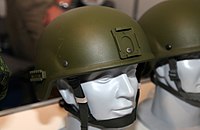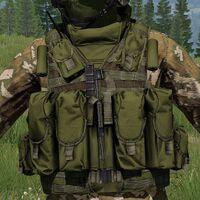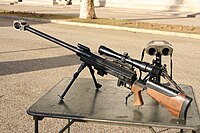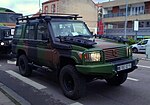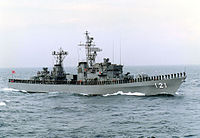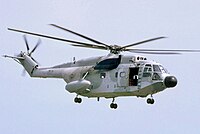United Communes Defense Forces: Difference between revisions
| Line 412: | Line 412: | ||
| [[File:Ase6102-H26,7,22.JPG|200px|center]] | | [[File:Ase6102-H26,7,22.JPG|200px|center]] | ||
| {{wpl|Spy ship}} | | {{wpl|Spy ship}} | ||
| 4,500 | | 4,500 tons | ||
| | | | ||
*2 × quad cannister multi-purpose missile battery | *2 × quad cannister multi-purpose missile battery | ||
Revision as of 16:27, 8 July 2021
| Messidorian Armed Forces | |
|---|---|
| Forces Armées du Messidor Iɣskrbiln n Mgrawi | |
| File:Messidor Army Emblem.png File:Messidor Naval Jack.png File:Messidor Roundel.png The Messidorian Army Corps' emblem, the Navy Corps' jack, and the Air Corps' roundel | |
| Founded | 1839 |
| Service branches | Messidorian Army Corps Messidorian Navy Corps Messidorian Air Corps |
| Leadership | |
| President of the Union | Yolande-Minerve Saverne |
| Commissioned Chairperson | General Rezki Tinifsan |
| Personnel | |
| Military age | 18-55 |
| Conscription | Voluntary service only |
| Active personnel | 102,800 total: Army Corps: 55,200 Navy Corps: 31,500 Air Corps: 16,100 |
History
The Messidorian Army and Navy Corps were founded in 1839, 8 years after the founding of the Messidor Union. The formation of a standing military was a contentious issue among the various syndicates who had originally called to rely upon civil militias organized at a local level rather than a central military. After the loss of northern Tafriqt in 1833, the notion that such a force could effectively protect the Union was effectively dispelled, though it took a further 6 years before the exact details of the Messidorian Armed Forces would be determined. From the outset, the Army and Navy Corps were small, professional, volunteer forces which were organized under a federal union. Merovian and later Aɣmatian factories ensured that they were well-equipped and supplied, though the forces established an enduring reputation of poor discipline. Despite their reputation, the first major deployment of the Messidorian Army Corps in the Annexation of the Timna Strip in 1919 was a great success. The Messidorian Navy Corps served nearly the entirety of its first century and a half of existence as a patrol and deterrence fleet for ships making the transit across the Periclean Sea. During the Reannexation of Tafriqt in 1950-51, the Navy Corps ran blockades around the coast of Tafriqt and prevented any seaborne assault. They also saw major surface combat during the Fourth West Scipian War. The Messidorian Air Corps was founded in 1920 and rounded out the three branches. Elements of the Messidorian intelligence services are also incorporated into the armed forces, specifically the Naval Infantry Brigade of the Army Corps, which conducts counter-intelligence, special reconnaissance, and direct intervention missions.
Structure
The structure of the Messidorian Armed Forces is highly unusual for most nations but ultimately consistent with the Union's own logic. While elsewhere officers are trained and awarded commission and a strict military hierarchy is followed, each unit level of the Messidorian Armed Forces elect their commanders, i.e.: an infantry section elects its sergeant, a ship elects its captain, and the general staff is elected by its branch of service. Elibigilty for commissioned roles is often subject to criteria of education or seniority. It is this particular element of the armed forces' structure that bewilders more disciplined military forces in the world. For their part, officers and enlisted members of the Messidorian Armed Forces hold that the system creates a greater sense of camaradery and investment in the service.
The combined armed forces is overseen by the Directorate of Defence Armed Forces Committee. The committee is chaired by the most senior of the elected members who are commanders of each of the three branches. The Director of Defence is also a member of the committee. The present chairperson of the committee is General Rezki Tinifsan. Below the committee each branch has its own general's staff composed of the commanders of its subgroups and their staffs.
The Army Corps is composed of twenty regiments and an air component divided among two divisions: one based in Aɣmatia and the other in Merovia. At an operational level the regiments are organized into 8 brigades; 4 for each division. While conscription is unconstitutional in the Messidor Union, additional volunteer regiments can be raised in emergencies. There is no standing reservist force in the Army Corps.
The Navy Corps operates under a single unified fleet - the Periclean Fleet. The formal organization of the fleet is much looser than the Army Corps and most of the officers maintain the rank of "Captain", taking on command of larger formations only for the duration of a particular deployment. Presently, the Navy Corps has a few active deployments in the Periclean protecting the corridor between Merovia and Aɣmatia.
The Air Corps has two air divisions which are not strictly organized along geographic lines. Each division has 5 wings which may have as many as 72 aircraft each or as few as 15 according to the wing's role. Unlike both the Army Corps and the Navy Corps, the Air Corps has 6 air reserve squadrons which fly the dated but not yet obsolete AAB-F32/B3 Tiara fighter aircraft.
Branches of service
Messidorian Army Corps
The Messidorian Army Corps counts over 55,200 members across two divisions; one based in Merovia and the other in Aɣmatia. The Army Corps is also supported by a number of employees and government workers. Founded in 1839, the Army Corps began as an organizing body for many armed militias across the Union. By the 1850s, the Army Corps developed into a professional fighting force. The last militia forces were disbanded or organized into professional reserves by the early 20th century.
Despite the population gap between Aɣmatia and Merovia, Army Corps personnel are distributed relatively equally between the two nations. The majority of training is conducted in southern Aɣmatia, but soldiers are trained in multiple environments. The forces of the Army Corps count twenty-two regiments. Regiments are divided into brigade groups at an operational level. Messidorian brigades are relatively large, including between six and eight battalions. The two main types of brigades which are fielded are armoured brigades and infantry brigades. The former are primarily composed of tanks and mechanized infantry with supporting reconnaissance and artillery elements. The latter are primarily light infantry.
Equipment
| Model | Image | Origin | Type | Notes |
|---|---|---|---|---|
| CC-T84B2 | Helmet | |||
| JC-T85B1 | Combat vest | |||
| PC-T66/B PC-T66/V |
Camouflage | In both desert tan and temperate olive |
Arms
| Model | Image | Origin | Type | Calibre | Notes |
|---|---|---|---|---|---|
| Small arms | |||||
| PA-M16/A1 Isque |
Pistol | 10×25mm | Standard service pistol | ||
| FA-M45/D2 Rz Awl |
Assault rifle | 7×40mm | Standard service rifle | ||
| FA-M35/B1 Rz Adaw |
Assault rifle | 7×40mm | Service and reserve rifle, derived from the PAL | ||
| FR-X(O-NO)23/B3 Asmawi |
Battle rifle | 8×57mm | Standard marksman rifle, imported PAL | ||
| PM-M32/B1 Imik |
Submachine gun | 10×25mm | |||
| FM-XO28/A3 Stulskabus 8 |
Medium machinegun | 8×57mm | Section support weapon and vehicle-mounted machinegun | ||
| FM-M03/A3 Stulskabus 13 |
Heavy machinegun | 13×92mm | Vehicle-mounted machinegun | ||
| FRCM-M70/A1 | Anti-matériel rifle | 13×92mm | In limited use with special forces | ||
| MP-M54/A2 | Portable ATGM | 136mm | |||
| LG-M58/A1 Issoufir |
Grenade mortar | 50mm | |||
| G-XO23/A5 Dikra |
Hand grenade | ||||
| Mle 64/8 | Bolt-action rifle | 8×57mm | Straight-pull action, in training and ceremonial use, limited conversion to marksman rifles | ||
Vehicles
| Model | Image | Origin | Type | Armament | Notes |
|---|---|---|---|---|---|
| Armoured vehicles | |||||
| CM-A77/A2 Izm |
Third generation main battle tank | 105mm rifled cannon 13mm machinegun 8mm machinegun |
Co-developed with the Ostrozavan OPUv.78 series, the North Ottonian M15/VII series, and the Tsurushiman Type 90 Equipped with 105mm gun-launched AT missiles | ||
| CM-A20/C2 Tizmt |
Fire support vehicle | 2× 30mm autocannons 4× 136mm ATGM launchers 2× 50mm grenade launchers 13mm machinegun 8mm machinegun |
Built on the A20 chassis | ||
| CM-A20/B3 Lancier |
Second generation main battle tank | 105mm rifled cannon 13mm machinegun 8mm machinegun |
|||
| VBC-A40/A1 Feneq |
Infantry fighting vehicle | 30mm autocannon 8mm machinegun |
|||
| VBR-A42/B1 Basset |
Reconnaissance vehicle | 90mm rifled cannon 8mm machinegun |
Built on the A40 chassis | ||
| VBA-A69/A1 Martel |
Self-propelled artillery | 155mm howitzer | Built on the A40 chassis | ||
| VA-A69/B2 Zizouar |
Mobile SAM platform | 4× 136mm SAM launchers | Built on the A40 chassis | ||
| Light vehicles | |||||
| CU-XNO68/A6 CU-XNO68/A10 Dromadaire |
Utility, transport, and cargo vehicles | Converted civilian vehicle, 6x6 and 10x10 configurations | |||
| CU-XT53/A1 Linx |
Utility and transport vehicle | Converted civilian vehicle | |||
| Aircraft | |||||
| HA-XT66/A2 Kitakazé |
Attack/scout helicopter gunship | 30mm autocannon 12× 136mm ATGM launchers |
|||
| AU-F51/A1 | Cargo/transport plane | Converted civilian aircraft | |||
The Messidorian Navy Corps was formally established in 1839 and, unlike the Army Corps, had no effective predecessor. The first warships in 50 years were laid down in Aɣmatia shortly after. At present, the Navy Corps has 62 active warships in addition to several support vessels. The Periclean Fleet, the largest organizational unit of the corps, is headquartered in Port Isadore in Merovia, but the Union's shipbuilding industry is still largely based on Aɣmatia's coasts.
Vessels in active service
| Class | Image | Role | Displacement (standard) |
Armament | Number in service | Notes |
|---|---|---|---|---|---|---|
| Yu'tanuɣi-class assault platform | Amphibious assault ship | 14,300 tons |
|
3 | Carries up to 15 helicopters, 200 armoured vehicles, and 720 infantry | |
| Tamdda-class destroyer | Air-defense destroyer | 7,500 tons |
|
4 | Carries an HA-XT66/A2 Kitakazé helicopter with a submarine-hunting loadout | |
| Tmassa-class frigate | Anti-submarine frigate | 3,500 tons |
|
12 | Carries an HA-XT66/A2 Kitakazé helicopter with a submarine-hunting loadout | |
| Azbar-class frigate | Escort frigate | 2,100 tons |
|
4 | ||
| Bri-class corvette | Escort corvette | 1,300 tons |
|
16 | ||
| Tillas-class submarine | Attack submarine | 2,800 tons (submerged) |
|
8 | ||
| Tuhan-class patrol vessel | Patrol vessel | 250 tons |
|
10 | ||
| Mintirzi-class minesweeper | Minesweeper | 600 tons |
|
10 | ||
| Awɣaman-class replenishment ship | Replenishment ship | 8,100 tons |
|
4 | ||
| Zrskradaln-class surveillance ship | Spy ship | 4,500 tons |
|
4 |
Messidorian Air Corps
The most recent branch of the Messidorian Armed Forces is the Messidorian Air Corps. Founded in 1920 after the Annexation of the Timna Strip, the Air Corps primarily provided aerial reconnaissance. Over the next few decades, the role and capabilities of military aircraft rapidly evolved. At present, the Air Corps is the only branch of service to maintain an active reserve force, owing in part to the amount of training required to operate and maintain a fleet of aircraft. The Air Corps is organized across two wings and includes several hundred aircraft. Any aircraft seconded to the Army or Navy Corps are provided and operated by the Air Corps. In addition to its military roles, the Air Corps also provides search and rescue and emergency airlift services. Many of these additional functions are performed by reservist members.
Aircraft in active service
| Model | Image | Origin | Type | Notes |
|---|---|---|---|---|
| Ava 70 | Multi-role fighter | |||
| AAB-F32/B3 Tiara |
Multi-role fighter/interceptor | In use for training and reserve squadrons | ||
| HA-XT66/A2 Kitakazé |
Attack/scout helicopter gunship | |||
| HU-XJ50/A1 Ouiya |
Search and rescue helicopter | |||
| HU-F32/A3 Péloquin |
Cargo/transport helicopter | |||
| AU-F51/A1 | Cargo/transport plane | Converted civilian aircraft, electronic warfare variant |
Ranks and insignia
All three branches of service make use of the same rank insignia, though titles vary.
Officer ranks
Enlisted ranks
| OR-10 | OR-9 | OR-8 | OR-7 | OR-6 | OR-5 | OR-4 | OR-3 | OR-2 | OR-1 | |
|---|---|---|---|---|---|---|---|---|---|---|
| Insignia | File:Messidor OR-10.png |  |
 |
 |
 |
 |
 |
 |
 |

|
| Army Corps Rank | Corps Sergeant Major |
Regimental Sergeant Major |
Battalion Sergeant Major |
Company Sergeant Major |
Platoon Sergeant |
Sergeant | Corporal | Senior Soldier |
Soldier | Recruit |
| Navy Corps Rank | Corps Chief |
Enlisted Chief |
Bridge Chief |
Deck Chief |
Watch Chief |
Watch Sergeant |
Senior Sailor |
Sailor | Junior Sailor |
Recruit |
| Air Corps Rank | Corps Sergeant Major |
Wing Sergeant Major |
Squadron Sergeant Major |
Flight Sergeant Major |
Watch Chief |
Watch Sergeant |
Senior Airperson |
Airperson | Junior Airperson |
Recruit |
